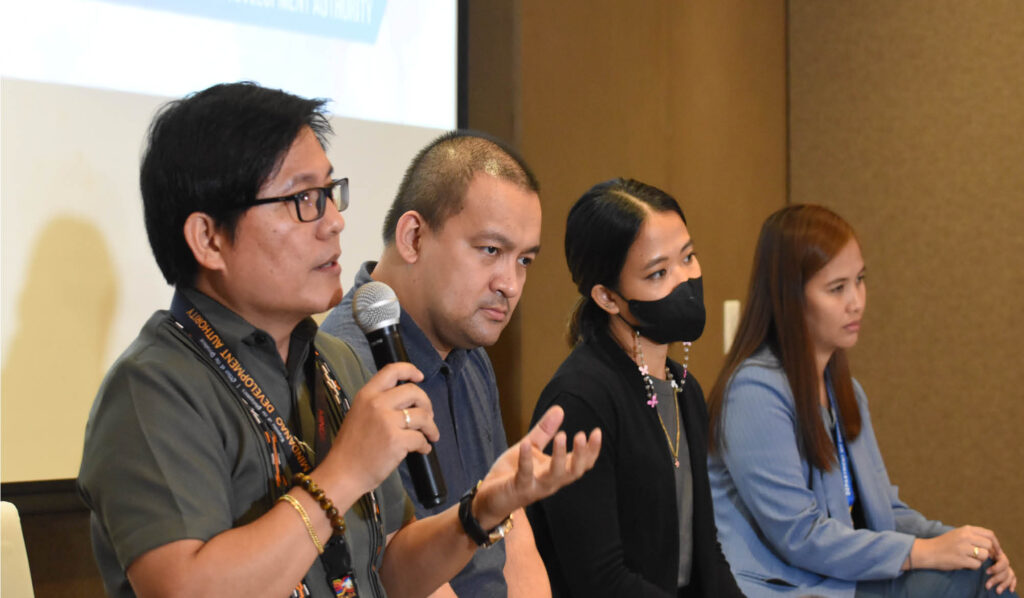
Local Energy Efficiency and Conservation Plan (LEECP): Setting the Context
Local energy planning is a comprehensive and systematic approach to addressing a particular locality’s energy needs and challenges. It recognizes that energy planning cannot be a one-size-fits-all approach and must consider the unique characteristics, resources, and priorities of a specific geographic area, such as a city, town, or region. Shedding light with regard to the matter, Asec. Romeo M. Montenegro, Deputy Executive Director of Mindanao Development Authority (MinDA), discussed with the participants and stakeholders every facet of Mindanao’s current situation regarding its progress and development.
Asec. Montenegro added they are intensifying their efforts to effectively execute the mandates stipulated in the Republic Act No. 9996)— An act creating the Mindanao Development Authority (MinDA), defining its powers and functions, providing funds, therefore and for other purposes. He revealed that they are mandated to advance the Mindanao C.H.I. (Coordination, Harmonization, and Integration).
Furthermore, Asec. Montenegro cited that there were 26.25 million people in Mindanao based on the 2020 Philippine Statistics Office (PSA) census; six (6) regions; twenty-eight (28) provinces; thirty-three (33) cities; four hundred twenty-two (422) municipalities; and ten thousand eighty-four (10,084) barangays. With its population and total land area, he noted that Mindanao—as the “Country’s Food Basket”—is the key to national economic recovery, landing it as one of the top exporters in the world: top 3 banana exporters, top 3 seaweeds exporter, top 4 pineapple exporter top 7 rubber producer, and top 8 tuna producer.
Asec. Montenegro also laid the Mindanao Economic Recovery Agenda that focuses on the following:
- roll-out more regional inter-linkages and logistics hubs;
- accelerate connectivity projects;
- need to bring agri products up the value chain;
- unlock innovative finance solutions;
- promote industrial growth, agri-manufacturing;
- growth to be more inclusive and sustainable; and
- enhance electrification in off-grid areas.
However, despite Mindanao’s thriving, it faces numerous challenges—the inevitable odds. Asec. Montenegro presented some of the impediments that Mindanao has faced and will face as it progresses. They include (1) waterless barangays; (2) projected temperature rise in risk areas, (3) supply and demand of water; (4) influx of coal-powered plants and other power supply-related issues.
The Way Forward
In addressing the challenges Mindanao faces, such as climate change, water supply, and power-related issues, advocating for an inclusive energy transition is essential. This transition involves shifting to renewable energy sources, mitigating climate change impacts, reducing projected temperature rise in vulnerable areas, and building resilience. Moreover, it promotes water conservation, improves access to potable water, and addresses power supply challenges. Inclusivity ensures the active involvement of all stakeholders, particularly marginalized communities, in decision-making processes and ensures equitable distribution of benefits, paving the way for a sustainable and fair energy future for Mindanao.
Pursuing the Path to Mindanao’s Energy Transition
The Mindanao Power Monitoring Committee (MPMC), established under Executive Order 81, has been assigned the responsibility of facilitating coordination among national, regional, and local government entities, as well as power industry stakeholders, to enhance the power situation in Mindanao. The members are the following: MinDA, Chairperson; DOE, Co-chairperson; ERC; NEA; NPC; PSALM; Mindanao Electric Power Alliance (MEPA); Association of Mindanao Rural Electric Cooperatives (AMRECO).
Significantly, the local energy planning in Mindanao is crucial for addressing the region’s specific energy needs and challenges. Asec. Romeo M. Montenegro of MinDA highlighted the importance of executing the mandates stipulated in the Republic Act No. 9996 and advancing the coordination, harmonization, and integration efforts in Mindanao. With a population of 26.25 million and diverse economic contributions, Mindanao plays a vital role in the national economic recovery.
The Capacity Building of Local Government Units on Local Energy Planning was held on June 27, 2023, at Acacia Hotel, Davao City. It involved the collaboration of Mindanao Renewable Energy Acceleration and Coordination Hub (MinREACH), along with Mindanao Development Authority (MinDA), Peace and Equity Foundation (PEF), Ateneo de Davao University-Mindanao Renewable Energy R&D Center (AdDU-MREC). The main purpose of this activity is to encourage local government units (LGUs) to develop their local energy plans and establish local energy committees, aligning with the guidelines provided by the Department of the Interior and Local Government (DILG) and the Department of Energy (DOE).